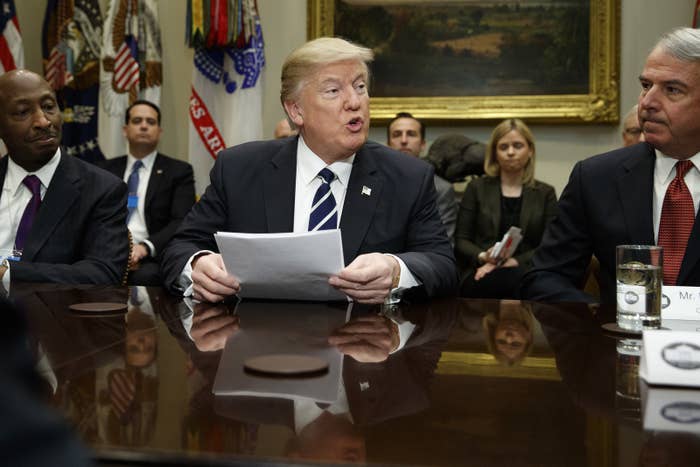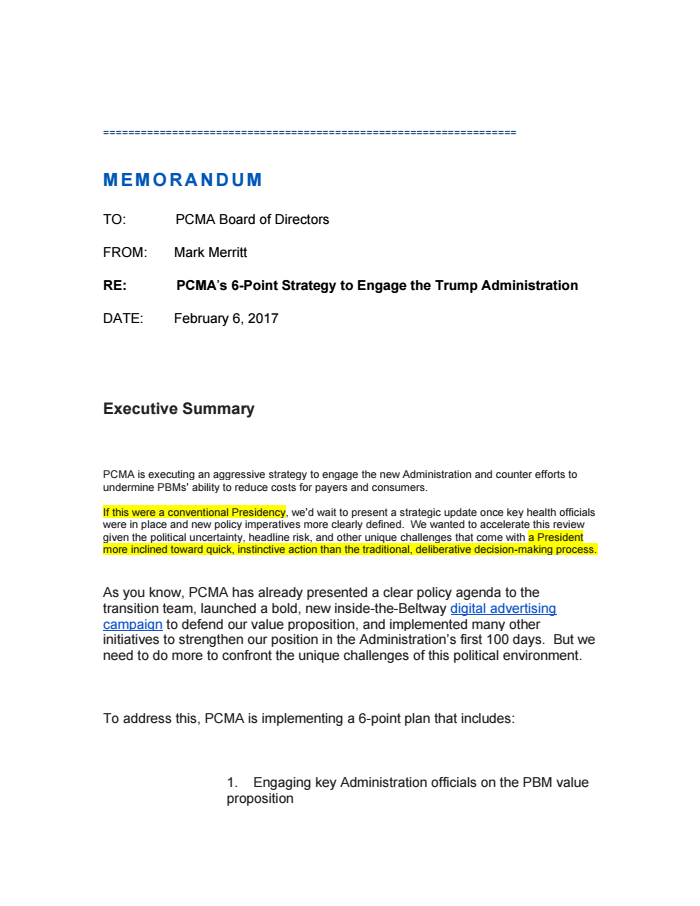
The lobbying group for pharmacy benefit managers — the health plan negotiators caught in the cross hairs of the debate over skyrocketing drug prices — are extremely worried about President Trump’s plans for them, an internal memo says.
"The sense that this President could make any decision, at any time, for any reason, on any issue is rattling industries in the health care sector and beyond," wrote Mark Merritt, president and CEO of the Pharmaceutical Care Management Association (PCMA). The memo was sent to PCMA's board of directors and was shared with BuzzFeed News by an industry source.
"If this were a conventional Presidency," Merritt wrote, then the group would wait to present a strategic update once health officials had clearly laid out their policies. Instead, the group has decided to push forward more aggressively, he said, "given the political uncertainty, headline risk, and other unique challenges that come with a President more inclined toward quick, instinctive action than the traditional, deliberative decision-making process."
PCMA did not respond to a request for comment. Pharmacy benefit managers negotiate drug prices and availability for some 266 million Americans in private and employer health plans, unions, and federal plans.
The issue of drug pricing caught headlines in the last year after "pharma bro" Martin Shkreli raised the price of a drug for HIV patients from $13.50 to $750 a pill, and after Mylan, manufacturer of the life-saving EpiPen, hiked up its prices by about 500%. Overall, from 2008 to 2015, the price of nearly 400 generic drugs increased by more than 1,000%.
Last week, Trump met with pharmaceutical executives at the White House to discuss accelerating FDA approvals and reducing "astronomical" drug prices.
"We have to do better," Trump wrote in a Facebook post following the meeting. "We have to get lower prices, we have to get even better innovation."
But there is a lot of uncertainty of what the new administration will actually do to disrupt the current drug pricing system.
Trump has claimed he wants to use trade agreements to raise US drug prices abroad. And as recently as Tuesday, Trump’s spokesman Sean Spicer said in a briefing that the new president “absolutely” wants to negotiate drug prices in Medicare — a move that PCMA would oppose.
Regardless, the memo makes clear the messages have caused PCMA anxiety.
"I think the fear is 100% about the government setting prices," Joseph Ross, associate professor of medicine and public health at Yale Medical School, told BuzzFeed News. "If the government were to come in and set prices — everyone from the pharmaceutical industry to the insurance companies to pharmacies and pharmacists — they’re all wondering what that’s going to mean for their margin and their bottom line."
The memo makes clear that PCMA will try to tackle the issue headlong by aggressively engaging with White House staffers and "building a political firewall" on Capitol Hill to guard against drug pricing provisions in any ACA legislation that is passed. It also identifies several key Trump aides they are looking to set up meetings with including Katy Talento, who serves on Trump's Domestic Policy Council, and Brian Blase, who is on the Economic Policy Council.
Merritt's memo also noted that he would be meeting with America's Health Insurance Plans (AHIP), the trade group representing the roughly 1,300 companies that sell private health insurance to Americans, this week to make sure they were aligned on their approach to the new administration.
But Ross underscored that it was still totally unclear whether Trump would actually move forward on any plans to set prices, or whether such a move would actually succeed in bringing down drug prices overall.
"They don’t know what they’re up against yet," Ross said. "They’re just sort of mobilizing the forces to say, 'We’ve got to be worried.'"

